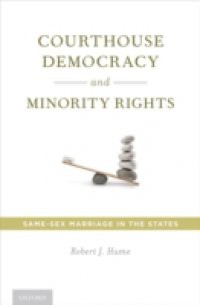In Courthouse Democracy and Minority Rights: Same-Sex Marriage in the States, Robert J. Hume examines how the democratization of state courts and state constitutional systems has influenced the capacity of judges to protect minority rights. Through an intensive examination of same-sex marriage policy, Hume shows that democratic innovations like judicial elections and initiative amendment procedures have conditioned the impact of judges on state marriage laws. Using a combination of original and publicly available data, Hume demonstrates that courthouse democracy has influenced the behavior of state judges, the reactions of the public to state court decisions, and the long-term policy consequences of these decisions, including the passage of state constitutional amendments. Hume concludes that judges will be capable of producing meaningful social change-and protecting minority rights-only when they have the institutional resources that they need to stand against popular opinion.

